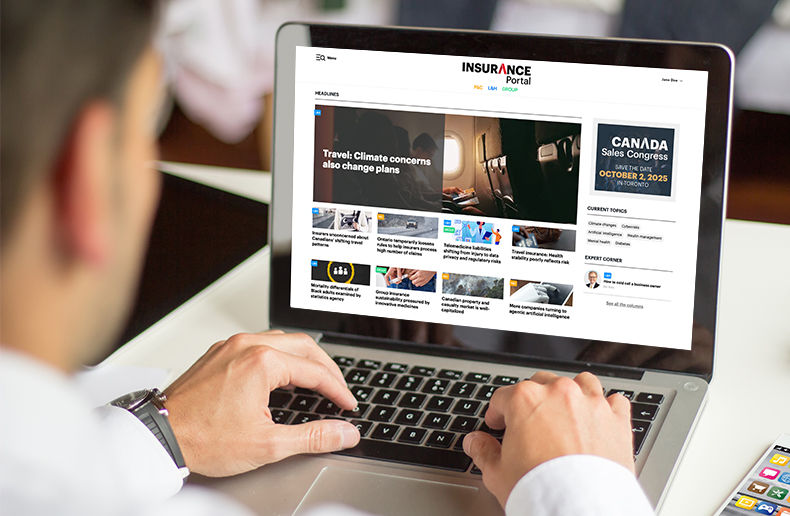Equitable Life is staking its future on a new business strategy that will propel the company into the mid-sized life insurance market. Equitable plans to double its premium volume, streamline distribution, and be known as the “best alternative” to the larger players in the industry.
The wheels are already in motion. With its product overhaul complete, the company’s strategy is to focus on expanding its distribution and services.
After some tough times in the late 1980s, Equitable Life is now a financially solid company that is poised to springboard into the mid-sized market, explains Michael Dawe, vice-president of Equitable’s individual division, in an interview with The Insurance Journal.
Mr. Dawe says the firm’s current president and CEO, Ron Beettam, is keen to build on this sound foundation and turn the insurer into a “truly mid-sized company,” hoping to rise from 14th spot to eventually become the 7th or 8th largest insurer in Canada. This would mean doubling its current premium volume.
Given the consolidation that has taken place in the insurance business, management believes the way to reach that goal is to position Equitable as the “best alternative” to the larger players.
One of the steps to become that alternative has been to revamp the company’s entire individual product portfolio. “In 2006, we’ve probably been the most active life insurance carrier in bringing out product to the field,” says Mr. Dawe.
He points to a revised universal life policy launched in February, followed by new preferred term 10 and term 20 coverage unveiled in May, then new segregated funds released in September. The changes were not only in design, but also in price and compensation.
He suggests the reforms will help to keep Equitable on advisors’ shopping lists. “We’re not always going to be best...But you’re always going to know that we’ll be competitive.”
The adjustments appear to be paying off. According to Mr. Dawe, LIMRA International reports that Equitable’s new individual sales were up by 37% as of third quarter 2006, and Mr. Dawe adds that premiums have grown substantially. He attributes this improvement to the company’s new preferred term offering, which has made the company more attractive in the $1 million to $5 million large case market.
Consolidating distribution
At the end of 2006, Equitable did business with 62 managing general agencies (MGAs) across Canada, serving about 12,500 advisors. Of that number, 2,500 to 3,000 are classified as active producers, meaning they submit more than two applications a year.
The insurer appeals to many small and medium-sized agencies because of its flexible contracting arrangements. Under the right circumstances, Equitable will issue an MGA contract to a boutique firm that might not be able to obtain a similar arrangement with other insurers.
Mr. Dawe says Equitable is “actively looking for good partners,” but he also expects the insurer will gradually reduce the number of MGAs it deals with to 40 to 45 over the coming years.
Some of the trimming will be accomplished through attrition and industry consolidation, and in some cases the company may encourage smaller players to move over and become an associate general agent at another MGA. “We do not want to be on somebody’s shelf,” explains Mr. Dawe. Ideally, Equitable wants to earn 25 to 35% of an MGA’s business, and either be one of it’s top three or four carriers or at least be moving in that direction.
As for compensation, Equitable issues multi-tiered contracts that are tied to an MGA’s business plan. “If you say, ‘I’m going to do $200,000 [first-year commissions] with you this year,’ well, we have a contract with an override that will match that. And then we’ll work with you to validate that contract,” he says.
Remaining a mutual
One thing Equitable does not plan to do is abandon mutuality. Its 2005 annual report states clearly that it has no intention of converting to a stock company. Mr. Dawe says that staying mutual allows the company to focus exclusively on the needs of clients and advisors. “It’s an asset for us. We focus on policyholders, not shareholders.”
In fact, the benefits of mutuality have become a core component of the company’s marketing material. Tami Dietrich, manager of marketing services, says that advisors, especially those who have already had to guide clients through other insurance company mergers and acquisitions, can easily see the advantage of placing business with an insurer that will not be bought out.
“We will remain mutual,” repeats Mr. Dawe. “Put that in bold.”
New services
Equitable is also investing in technology to make it easier for advisors and MGAs to place and service business.
Ms. Dietrich says that Equitable has deemed 2007 to be its own year of e-commerce and is upgrading its back office computer system. “What we want to do is focus on some web capabilities and really enhance our web site,” she says. The very first changes will be aimed at advisors, including access to information about new business pending.
For example, when advisors log in to Equitable’s web site, Ms. Dietrich says they will be able to look through unsettled cases and see if there are attending physicians’ statements outstanding. They can then speed up the process by encouraging clients to follow up with their doctors. Equitable is also considering how it can offer more detailed information on investment products online, and use electronic forms to allow advisors to make changes directly.
The insurer is adding technical firepower to its group division as well. “We’ve spent a lot of time, energy, and money the last few years replacing our core group insurance system,” says Karen Mason, vice-president of group insurance.
The company now has a single platform that does quotes, issue, renewals, certificate administration, and all forms of claims. It is already able to offer web-based access to both plan sponsors and plan members, and web access for group advisors is currently in pilot and will be rolled out sometime in 2007.
These enhancements are part of Equitable’s plans to go after a larger sized group insurance customer and reach a target of $36 million in group sales for 2007. While 20 to 200 lives had been the company’s traditional target market, the company now has its eyes on the 20 to 500 range. Not only does the new computer system allow them to offer the kind of services this segment expects, but Ms. Mason says it will also makes it easier for Equitable to custom design products.
More training
The “Equitable Life University” program is another service initiative that has been well received. With the decline of the career system, producers do not have access to the sort of in-house professional development they once enjoyed. “Advisors are asking for training. They want to learn how to grow their business,” says Mr. Dawe. Equitable has responded by offering two-day sessions tailored to either new entrants or industry veterans. Held at the MGA’s office, they cover sales concepts and practice management, but Mr. Dawe says specific products are not discussed. “One of the things advisors have told us is that they’re tired of product training.”
Besides putting more microchips in their computers, Equitable has been putting more people on the ground.
On the individual side there has been a veritable frenzy of activity, with the number of marketing managers going from 6 to 20 in just a year and a half. Sixteen of them specialize in life and four deal with investments. They are located in Vancouver, Calgary, Edmonton, Winnipeg, London, Hamilton, Toronto, Ottawa and Halifax. “We will add on as many as we need to penetrate the marketplace,” says Mr. Dawe, hinting that there may be more hires to come.
These new individual marketing managers will be responsible for cultivating a “Top 100” advisor list. To qualify, an advisor will have to place a minimum of $10,000 of Net Annualized First Year Commission. In return for this volume of business, advisors can expect more attention from Equitable, including a higher level of access to underwriters and help from the advanced marketing team. An application from a Top 100 advisor will go to the top of the pile, says Mr. Dawe.
Ms. Dietrich is quick to add that Equitable is still happy to accept good business from any producer and that there are no minimum production requirements. It’s just that concentrating business with Equitable will have its rewards.
Although Equitable does not serve Quebec at the moment, they are making plans to enter the province by late 2008 or early 2009. “It’s a great marketplace,” says Ms. Dietrich. “But you want to have all your ducks in a row. We want to make sure we are entering correctly.”
Service paying off
One might think that technology changes combined with rapid expansion would hurt customer service, but this hasn’t been the case. In a 2006 distribution service satisfaction survey conducted by NewLink consultants, Equitable Life came out as the number one service provider in Canada.
Mr. Dawe cites the company’s “submission to commission” prowess as an example of their commitment to advisors. Even though they had already improved application turn around time by about 15% last year, putting them in the top 10% in the industry, Mr. Dawe says that’s still not good enough. He wants to see that number down to 20 or 21 calendar days by the end of 2007.






